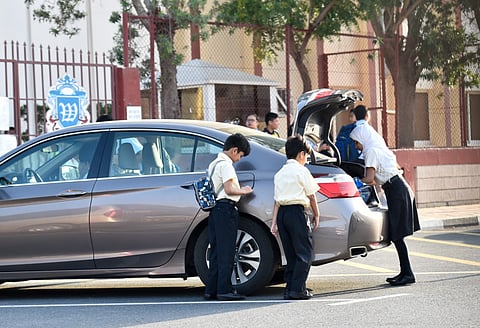School bus: To take or not is the question
As schools reopen, XPRESS reports on the raging debate on how students must commute

DUBAI As schools reopen after the spring break and new measures are introduced by the Dubai Roads and Transport Authority (RTA) to enhance school bus safety from April 1, the continued practice of parents avoiding buses in favour of their own cars has sparked a heated debate.
Starting April 1, an electronic tracking system using GPS spatial technology has become fully operational in all school buses in Dubai and school managements have been allowed to fit large school buses (over 50 seats) with 2X3 seats, provided they have two fire extinguishers, two attendants and two first aid kits in each vehicle.
Adel Shakri, director of planning and business development at RTA’s Public Transport Agency, said, “Due to safety and security implications, and to increase the capacity of school buses, March 1 had been set as a deadline for abolishing the use of minibuses in school transport services, following an 18-month grace period for schools to phase them out. The implementation of the School Transport Law has played a crucial role in maintaining the safety of different age groups of students using school buses, evident by a 10 per cent drop in the number of yearly accidents.”
Parents unconvinced
Not all parents, however, seem to be convinced.
Marialessandra, the mother of a 10-year-old at an American school, said: “My husband and I would never put our daughter on a school bus as we don’t trust the drivers. In our view, most of them still drive recklessly.”
Sarah, another mum who sends her three sons to an international school in Dubai Silicon Oasis, said it doesn’t make financial sense for her to use the bus service. “Why would I pay three times the steep fare when I can play private chauffeur to them?” asked the housewife, who lives in the same community.
Another parent, who drives all the way from Deira to Al Safa to drop off her daughter at an Indian school, said travelling by car saves precious time. “The bus route is too long-drawn and has too many stops. My daughter is in Class XII and can’t afford to waste time.”
The school operators have their own conclusions and vouch for their safety.
M.L. Augustine, managing director of School Transport Services, which uses 1,700 buses to ferry 65,000 students at 62 schools, said parents at international schools are more reluctant to use school bus services. “Only 15-20 per cent of students take our buses at international schools. In comparison, the uptake can be as high as 97 per cent in an Indian school.”
He said the time taken by a school bus is directly dependent on the number of students and their drop off and pick up points.
“On an average, a bus spends three to four minutes at every stop. It takes 52 minutes for one of our buses to pick up 16 students from a central point in Arabian Ranches and bring them to a school in Nad Al Sheba, covering a distance of 24 km. On the contrary, a bus picking up the same number of students from their doorsteps within the same community takes one and a half hours to reach an international school in Motor City, which is just next door and seven minutes away.”
He said the bus fee also depends on the number of students. “The average fee at a school which uses a big bus with 50 students is around Dh350-Dh400 per month. But the same fee can go up to Dh600-Dh800 if there are just 15 students.”
He said STS had launched a campaign to encourage students to take school buses. “The idea is to reduce traffic on the roads and around the schools. There is also the safety factor. Travelling by bus also helps children to interact and socialise with other children on the bus,” he added.
Others operators agree it is safer for children to commute on the school bus, but the choice is entirely up to the parents.
Kamran Ahmed, general manager, Fancy Transport, which runs 150 buses for four schools, said: “Ultimately, it boils down to what parents want to do. I personally feel school buses are a better option than cars because of the safety element. People make way for these heavy vehicles earmarked for school trips. Bus drivers can’t speed even if they want to because all buses are fitted with speed limiters. Children learn to share and care when they travel together.”
Mohammad Arshad, manager at Arab Falcon, which operates 250 buses for 10 schools, said: “It is up to the parents what they want to do. But the main factor is the safety that school buses afford.”
YOUSPEAK: What are your views on this debate?



